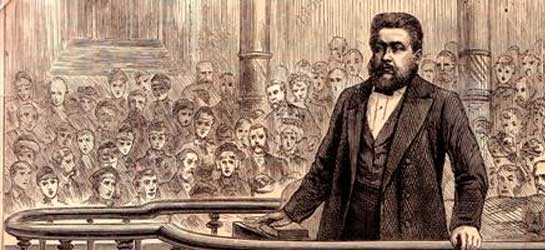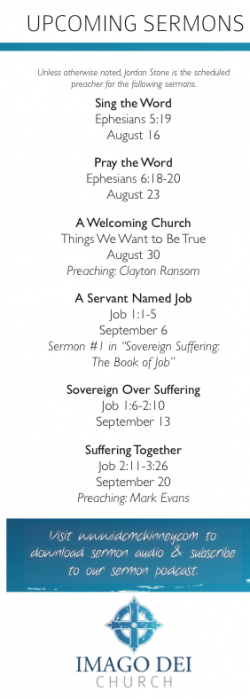The advent of a new fall semester often means the advent of a new sermon series for many churches. So it is for us at Imago Dei.
At the end of June we completed a ten-month study of Mark’s gospel, and then took the next eight weeks or so to think specifically about the sufficiency of God’s word for His church. For Psalm 119 says the word is our life, so we considered six ordinary ways – preaching, reading, seeing, supporting, singing, and praying – the life of God’s word resounds into the life of God’s church.
A STUDY FOR OUR SUFFERING
This weekend we begin a study of the book of Job that will, Lord willing, take us right up to Christmas time. A series on Job is no small endeavor. It is a 42-chapter book and one that’s been held in the highest regard by literary scholars for centuries. The Victorian essayist Thomas Carlyle said Job is “the grandest book ever written with pen.” Selections from Job were actually required reading in one of my college English literature classes. The great Reformer John Calvin preached 159 sermons on Job and we are aiming to do it in fourteen weeks! A tall, yet glorious, task awaits.
Over the past few months I’ve told quite a few people that my desire was to preach through Job this fall and the general response has been something like, “Oh. That’s i n t e r e s t i n g.” Meaning, “Are you sure you want to do that?” After much prayer, study, and deliberation I can say, “Yes, I am.” And let me give you two reasons why this book is uniquely valuable for our lives:
- God is sovereign. I am convinced that, outside of the gospel of Jesus Christ and sufficiency of Scripture, precious few truths are as life-transforming as God’s sovereignty over every atom in your body and galaxy in the universe. Job is a book that offers a stunning, if at times uncomfortable, portrait of a God sustaining and governing His creation.
- God’s people suffer. Jesus assumes the Christian life will be one of cross-bearing, Paul announces that everyone who desires to live a godly life will suffer, James says to expect it, and you don’t need to look very far before your eyes will fall on someone enduring pain, hardship, persecution, or trials.
What we need then, and why we turn to Job in these days, is clear and biblical understanding of how God’s sovereignty relates to the suffering of His people. Piper is right to say, “Pain and loss are bitter providences. Who has lived long in this world of woe without weeping, sometimes until the head throbs and there are no more tears to lubricate the convulsing of our amputated love? But O, the folly of trying to lighten the ship of suffering by throwing God’s governance overboard. The very thing the tilting ship needs in the storm is the ballast of God’s good sovereignty, not the unburdening of deep and precious truth. What makes the crush of calamity sufferable is not that God shares our shock, but that his bitter providences are laden with the bounty of love.”1
Our study of Job, Lord willing, will comfort those in our church who are suffering, encourage those who minister to suffers, and prepare us all for future suffering.
COMMENTARIES ON THE SHELF
In case you ever preach through Job here are some commentaries I have used in preparation, force ranked in order of how useful they’ve been so far:
- Christopher Ash – Job: The Wisdom of the Cross in Preaching the Word
- Derek Thomas – The Storm Breaks in Welwyn Commentaries
- Steven Lawson – Job in Holman Old Testament Commentaries
- David J.A. Clines – Job 1-20; Job 21-37 in Word Biblical Commentary
- Elmer Smick – Job in The Expositor’s Bible Commentary
- David Atkinson – The Message of Job The Bible Speaks Today
- David Jackson – Crying Out for Vindication: The Gospel According to Job in The Gospel According to the Old Testament
I can’t wait for this journey to begin. It wouldn’t surprise me if most Mondays this fall find me posting a sermon excerpt from our study in Job. I pray they will be useful meditations for us all.
- Piper, The Misery of Job and The Mercy of God, 9. ↩








